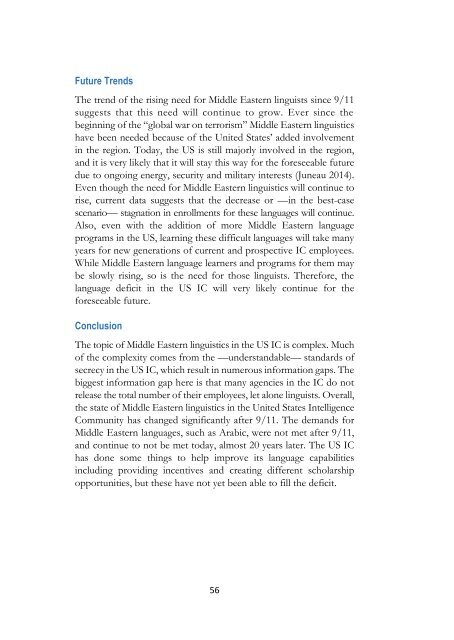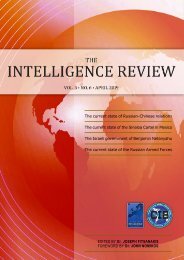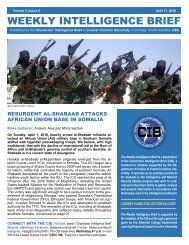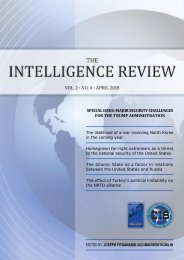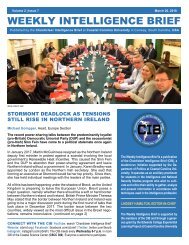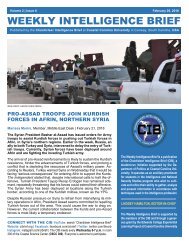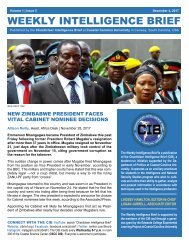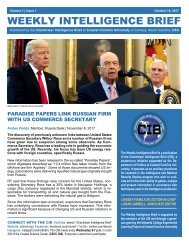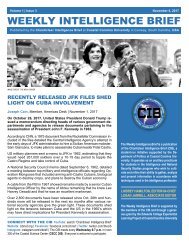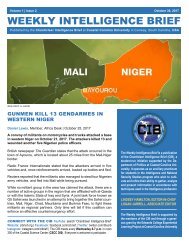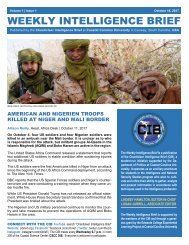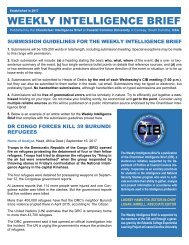The Intelligence Review | volume 3 | issue 5 |
This volume is the product of a collaboration between the European Intelligence Academy (EIA) and the Chanticleer Intelligence Brief (CIB), a pre-professional body supported by the Department of Politics at Coastal Carolina University in Conway, South Carolina, United States. Six CIB analysts tackle some of the most pressing and timely questions confronting intelligence observers today. Topics in this issue include the current and projected strength of the al-Shabaab militant group in East Africa, the future of the Iran nuclear agreement, and the current state of Mexico’s drug cartels. The issue also contains an analysis of the rising tension between the European Union and the government of Poland, as well as of the complex relationship between the United States and Cuba. The compendium concludes with an eye-opening report on the state of Middle Eastern linguistics in the United States Intelligence Community in the post-9/11 era.
This volume is the product of a collaboration between the European Intelligence Academy (EIA) and the Chanticleer Intelligence Brief (CIB), a pre-professional body supported by the Department of Politics at Coastal Carolina University in Conway, South Carolina, United States. Six CIB analysts tackle some of the most pressing and timely questions confronting intelligence observers today. Topics in this issue include the current and projected strength of the al-Shabaab militant group in East Africa, the future of the Iran nuclear agreement, and the current state of Mexico’s drug cartels. The issue also contains an analysis of the rising tension between the European Union and the government of Poland, as well as of the complex relationship between the United States and Cuba. The compendium concludes with an eye-opening report on the state of Middle Eastern linguistics in the United States Intelligence Community in the post-9/11 era.
Create successful ePaper yourself
Turn your PDF publications into a flip-book with our unique Google optimized e-Paper software.
Future Trends<br />
<strong>The</strong> trend of the rising need for Middle Eastern linguists since 9/11<br />
suggests that this need will continue to grow. Ever since the<br />
beginning of the “global war on terrorism” Middle Eastern linguistics<br />
have been needed because of the United States’ added involvement<br />
in the region. Today, the US is still majorly involved in the region,<br />
and it is very likely that it will stay this way for the foreseeable future<br />
due to ongoing energy, security and military interests (Juneau 2014).<br />
Even though the need for Middle Eastern linguistics will continue to<br />
rise, current data suggests that the decrease or —in the best-case<br />
scenario— stagnation in enrollments for these languages will continue.<br />
Also, even with the addition of more Middle Eastern language<br />
programs in the US, learning these difficult languages will take many<br />
years for new generations of current and prospective IC employees.<br />
While Middle Eastern language learners and programs for them may<br />
be slowly rising, so is the need for those linguists. <strong>The</strong>refore, the<br />
language deficit in the US IC will very likely continue for the<br />
foreseeable future.<br />
Conclusion<br />
<strong>The</strong> topic of Middle Eastern linguistics in the US IC is complex. Much<br />
of the complexity comes from the —understandable— standards of<br />
secrecy in the US IC, which result in numerous information gaps. <strong>The</strong><br />
biggest information gap here is that many agencies in the IC do not<br />
release the total number of their employees, let alone linguists. Overall,<br />
the state of Middle Eastern linguistics in the United States <strong>Intelligence</strong><br />
Community has changed significantly after 9/11. <strong>The</strong> demands for<br />
Middle Eastern languages, such as Arabic, were not met after 9/11,<br />
and continue to not be met today, almost 20 years later. <strong>The</strong> US IC<br />
has done some things to help improve its language capabilities<br />
including providing incentives and creating different scholarship<br />
opportunities, but these have not yet been able to fill the deficit.<br />
56


